The Most Influential People in Security 2016
Every year, Security magazine is pleased to honor top security executives and leaders who positively impact the security industry, their organization, their colleagues and peers, as well as the national and global security landscape.
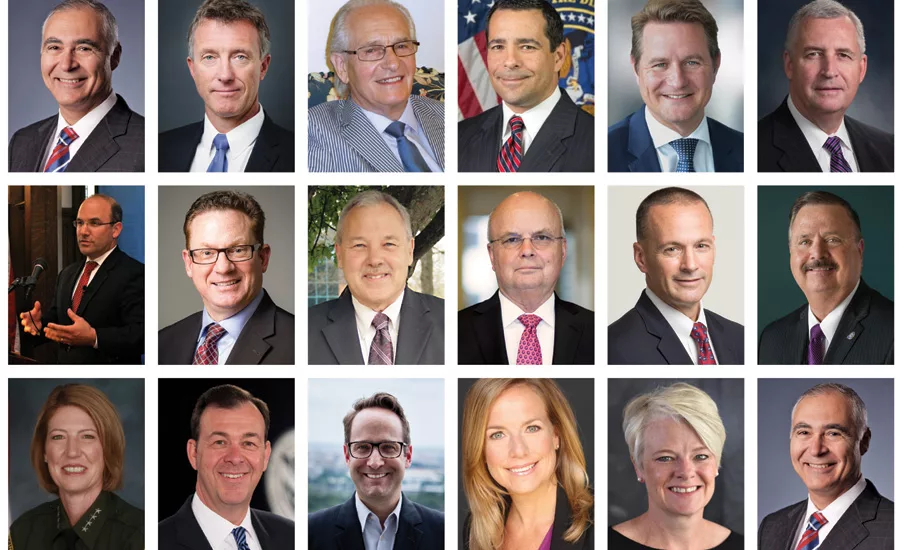
The Most Influential People in Security 2016
Every year, Security magazine is pleased to honor top security executives and leaders who positively impact the security industry, their organization, their colleagues and peers, as well as the national and global security landscape. They have been nominated by their colleagues and associates, and were chosen based upon their leadership qualities and the overall positive impact that their security projects, programs or departments have had upon their shareholders, organizations, colleagues and the general public.
This year’s Most Influential is organized by four categories: Corporate Security Executives, Government, University/Think Tanks, and Cybersecurity. We also have four Special Recognition recipients.
Congratulations to the Class of 2016 Most Influential People in Security!
Our special thanks goes to Lynn Mattice and Jerry Brennan, who were our project partners and who provided subject matter expertise and research.
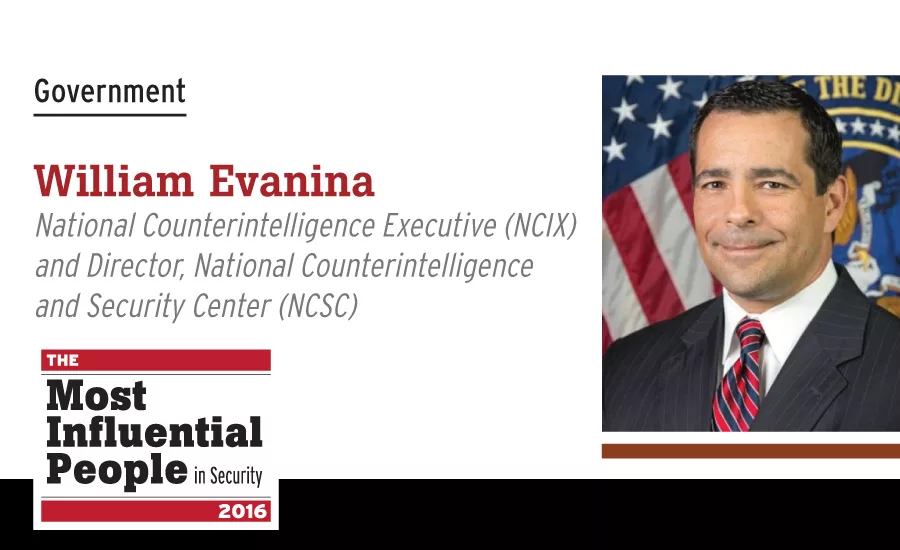
William Evanina, National Counterintelligence Executive (NCIX) and Director, National Counterintelligence and Security Center (NCSC)
William (Bill) Evanina has 25 years of service in the U.S. Government, 18 of which are in the FBI. Evanina became the fifth National Counterintelligence Executive (NCIX) in June 2014 and serves as the head of national counterintelligence for the U.S. Government. Evanina is responsible for leading the counterintelligence and security activities of the U.S. Government and the National Counterintelligence and Security Center (NCSC). He is dual hatted as the NCIX and the Director of the NCSC. In his current role, Evanina is responsible for producing the National Threat Identification and Prioritization Assessment and producing and implementing the National Counterintelligence Strategy and Damage Assessments. He serves as Chairperson of the National Counterintelligence Policy Board and is currently serving as the Chairperson of the Allied Security and Counterintelligence Forum, which is a collaborative venue of senior-level security and counterintelligence advisors who meet to address personnel, physical and technical security and counterintelligence matters related to the protection of designated intelligence information that is shared among Australia, Canada, New Zealand, the United Kingdom and the United States. Previously, he served as the chief of CIA’s Counterespionage Group, where he led personnel from multiple Intelligence Community agencies in an effort to identify, prevent and neutralize espionage related activities by foreign intelligence services.
Prior to his CIA assignment, Evanina served for two years as the assistant special agent in charge of the FBI’s Washington Field Office, where he led operations in both the Counterintelligence and Counterterrorism Divisions. In 2010, Evanina served as special assistant in the FBI’s National Security Branch where he oversaw policy formulation, training and finance of the National Security Branch. He also served as assistant section chief of the FBI’s Counterintelligence Division. Evanina, began his FBI career in 1996 and was assigned to the FBI’s Newark, New Jersey, Division where he investigated organized crime and violent crime matters.
Subsequent to 9/11, he was assigned to the Joint Terrorism Task Force investigating counterterrorism matters and participated in the Flight 93, Anthrax and Daniel Pearl investigations. Evanina was selected as a supervisory special agent within the JTTF in 2004 and led the espionage investigation of convicted spy Leandro Aragoncillo. In 2006, Evanina served as the senior supervisory special agent of the FBI’s Trenton, New Jersey, Resident Agency. Evanina holds a bachelor’s degree in Public Administration from Wilkes University in Wilkes Barre, Pennsylvania, and a master’s degree in Educational Leadership from Arcadia University in Philadelphia.
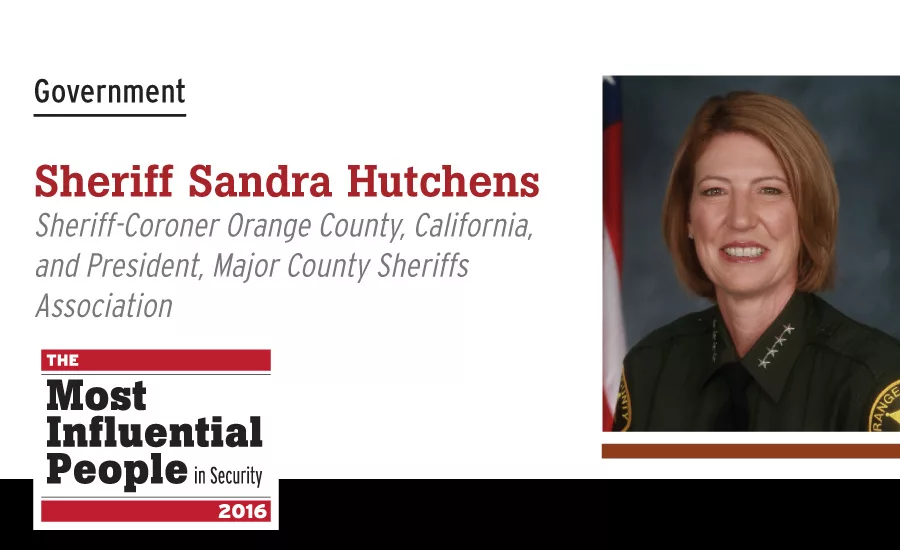
Sheriff Sandra Hutchens, Sheriff-Coroner Orange County, California, and President, Major County Sheriffs Association
Sandra Hutchens was sworn in as the 12th Sheriff-Coroner for Orange County in June of 2008. She began her law enforcement career with the Los Angeles County Sheriff’s Department in 1976. With more than 37 years of service in law enforcement, Sheriff Hutchens possesses invaluable experience in nearly every facet of law enforcement. Sheriff Hutchens leads more than 3,800 sworn and professional men and women who serve in areas as diverse as Patrol Operations, Criminal and Special Investigations, the County’s Crime Lab and Courts, Coroner’s Office, as well as those who serve in Orange County’s five jails, which collectively comprise the eighth largest jail system in the nation. The department provides a variety of vital public safety services to our communities. These include direct patrol services to more than 700,000 residents within the county’s unincorporated areas and via contract to thirteen municipal cities, the County’s three harbors, John Wayne Airport, and the Orange County Transportation Agency.
Professional affiliations include membership in the Major County Sheriffs’ Association, where she serves as president, the National Sheriffs’ Association, the International Association of Chiefs of Police, and the Orange County Chiefs’ of Police and Sheriff’s Association. Sheriff Hutchens serves as a board member for the National Executive Institute Associates, the California State Sheriffs’ Association and the Orange County Gang Reduction and Intervention Partnership. In 2012, she was appointed to the POST Commission by Governor Jerry Brown. In addition, the Sheriff sits on the Board of Directors for the Orange County United Way and is an Advisory Board Member for the National Law Enforcement Cancer Support Foundation.
Counter-terrorism training received in Israel, travels to Pakistan and Russia, and leadership training at the FBI National Academy, the FBI National Executive Institute and the National Preparedness Leadership Initiative course at Harvard University have provided Sheriff Hutchens with the expertise and vision needed to effectively lead an organization as diverse as the Orange County Sheriff’s Department.
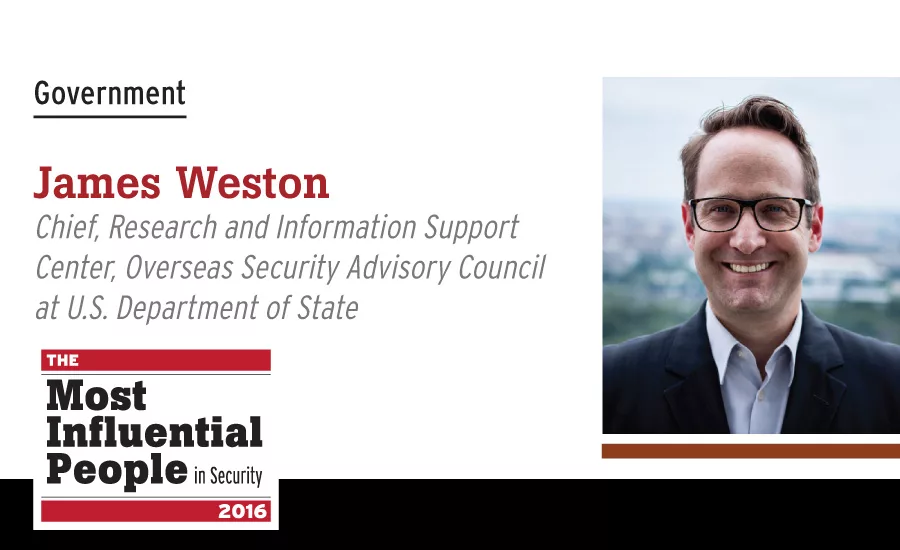
James Weston, Chief, Research and Information Support Center, Overseas Security Advisory Council at U.S. Department of State
James E. Weston became Chief of the Research and Information Support Center (RISC) for the Overseas Security Advisory Council (OSAC) in the Bureau of Diplomatic Security in April 2013. Weston is responsible for managing the day to day activities of the RISC staff, which supports the U.S. private sector by exchanging security information, analysis and threat warnings to protect personnel, facilities and intellectual property abroad. As RISC Chief, Weston leads three distinct units: Outreach and Engagement, Global Security, and Research & Analysis as well as a Major Events Program and oversight of www.OSAC.gov. Weston regularly meets with OSAC constituents though regional conferences, country council meetings and also supported the U.S. private sector during the 2014 Winter Olympics in Sochi, Russia. Before coming to OSAC, Weston served as the Chief of the Policy and Planning Division where he led all Diplomatic Security policy, standards and regulations development and Memoranda of Agreement and Understanding coordination for the Bureau.
As the Bureau Policy Officer, Weston was also Executive Secretary for the Overseas Security Policy Board, the DS Firearms Policy Review Board and was Bureau point of contact for the Benghazi Accountability Review Board recommendations. Weston previously served as Chief of the Policy Analysis Staff and Special Assistant to the DS Deputy Executive Director. He has supported DS protective operations at two UN General Assembly meetings and a World Economic Forum. Weston came to DS in January 2001, where he was in the Office of Administration until April 2004 managing the Law Enforcement Availability Pay program for more than 1,000 DS special agents and was the Move Coordinator for DS’s 2003 relocation to SA-20 in Rosslyn. Weston was an Assistant to the Chief of Staff at the Immigration and Naturalization Service where he earned a Meritorious Service Award. Weston holds a B.A. from Texas Christian University and completed the prestigious National Security Executive Leadership Seminar at the Foreign Service Institute in March 2011.
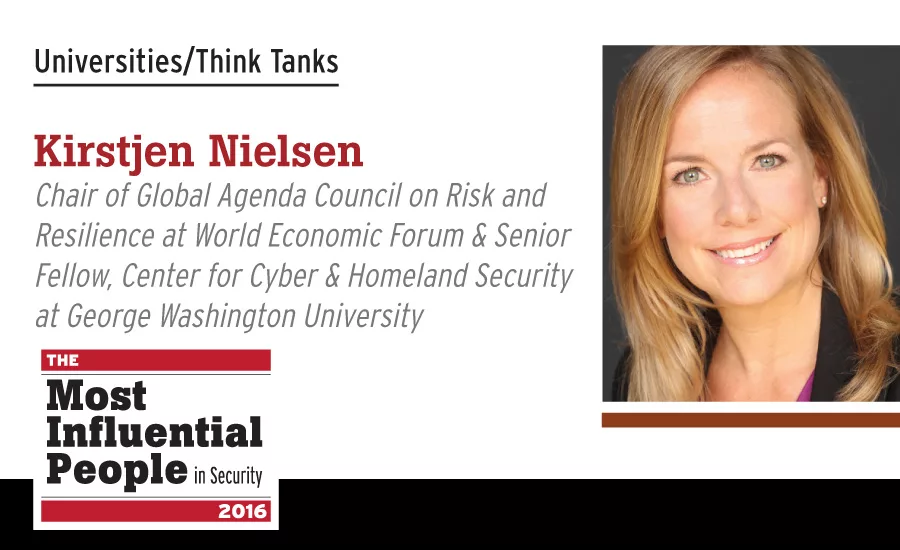
Kirstjen Nielsen, Chair of Global Agenda Council on Risk and Resilience at World Economic Forum & Senior Fellow, Center for Cyber & Homeland Security at George Washington University
Kirstjen Nielsen is an internationally recognized expert in risk management, security and resilience. She has worked in the homeland and national security sectors for more than two decades. Working at the crossroads of policy, strategy, risk and operational environments, she has a unique blend of operational and enterprise perspective on policy and strategy development, mission execution and the role of technology as an enabler and force multiplier. Nielsen is the Founder and President of Sunesis Consulting, LLC, an emerging risk and security management consulting firm. Nielsen guides government and private sector entities in identifying and understanding emerging threats and risks trends and provides a global perspective to support the development and adoption of best practices to ensure resilience in the face of evolving risk, increasing digitization, and multi-stakeholder environments.
She is the appointed Chair of the World Economic Forum’s Global Agenda Council on Risk and Resilience and serves as a civilian expert for NATO, advising on cybersecurity and the creation and use of public-private partnerships to address trans-global risks. She is also a Senior Fellow at the Center for Cyber and Homeland Security at the George Washington University and is an Advisory Board Member for the Center for Naval Analysis Safety and Security. Prior to founding Sunesis Consulting, LLC, Nielsen was the General Counsel and President of the Homeland Security and Private Sector Preparedness practice at Civitas Group, a strategy and management consulting firm focused on the security and government sectors. Previously, she was commissioned by President Bush to serve as Special Assistant to the President for Homeland Security and Senior Director for Prevention, Preparedness and Response on the White House Homeland Security Council. As a senior advisor, her responsibilities included the development, coordination and oversight of U.S. Government homeland security policy and the development of numerous Presidential homeland security policy documents on issues ranging from cybersecurity to public alert and warning to improvised explosive devices to information sharing. In that role, she also advised the President and White House senior staff on homeland security threats and risks, and served as the crisis manager for major events and emergencies. She has also held positions at the Transportation Security Agency and the U.S. Senate, and practiced corporate transactional law for Haynes and Boone. Nielsen has created and managed multiple organizations in government and in the private sector and served clients in both sectors as a management consultant, and thought leader/subject matter expert.

Juan Zarate, Chairman, Center on Sanctions & Illicit Finance; Chairman, Financial Integrity Network
Juan Zarate is the Chairman and Co-Founder of the Financial Integrity Network, the Chairman and Senior Counselor for the Foundation for Defense of Democracies’ Center on Sanctions and Illicit Finance (CSIF), and the Senior National Security Analyst for NBC News and MSNBC. He is also a Visiting Lecturer of Law at the Harvard Law School, a Senior Adviser at the Center for Strategic and International Studies (CSIS), and a Senior Fellow to the Combating Terrorism Center at West Point. Zarate served as the Deputy Assistant to the President and Deputy National Security Advisor for Combating Terrorism from 2005 to 2009, and was responsible for developing and implementing the U.S. Government’s counterterrorism strategy and policies related to transnational security threats. Zarate was the first ever Assistant Secretary of the Treasury for Terrorist Financing and Financial Crimes where he led domestic and international efforts to attack terrorist financing, the innovative use of Treasury’s national security-related powers, and the global hunt for Saddam Hussein’s assets.
Zarate is a former federal prosecutor who served on terrorism prosecution teams prior to 9/11, including the investigation of the USS Cole attack. Zarate sits on several boards, including HSBC’s Financial System Vulnerabilities Committee (FSVC) as well as the FSVCs for HSBC in Mexico and Latin America; the Vatican’s Financial Information Authority (AIF); the Board of Advisors to the Director of the National Counterterrorism Center (NCTC); the George Washington University’s Center for Cyber & Homeland Security; America Abroad Media’s (AAM) Board of Advisors; the Aspen Institute’s Homeland Security Group; the Coinbase Board of Advisors; and RedOwl Analytics Board of Advisors. He is a senior adviser to several technology companies and is a member of the Council on Foreign Relations. He is also the author of Treasury’s War: The Unleashing of a New Era of Financial Warfare(2013), Forging Democracy: A Comparative Study of the Effects of U.S. Foreign Policy on Central American Democratization(1994), and a variety of articles in The New York Times, Financial Times, Washington Post, Wall St. Journal, LA Times, the Washington Quarterlyand other publications.
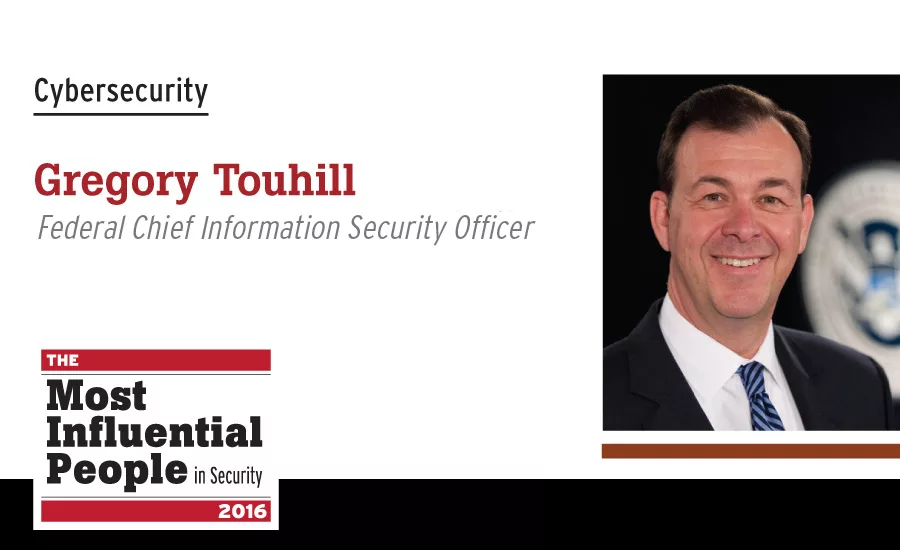
Gregory Touhill, Federal Chief Information Security Officer, Department of Homeland Security (DHS)
Brigadier General (retired) Gregory J. Touhill is the Deputy Assistant Secretary for Cybersecurity and Communications (CS&C) within the National Protections and Programs Directorate (NPPD) of the Department of Homeland Security (DHS), where he focuses on the development and implementation of operational programs designed to protect our government networks and critical infrastructure systems.
As of September 2016, General Touhill was appointed the new Chief Information Security Officer for the U.S. federal government.
General Touhill retired from the United States Air Force in July 2013 after a distinguished career culminating as the Chief Information Officer and Director of Command, Control, Communications and Cyber Systems at U.S. Transportation Command – one of the nation’s 10 combatant commands. As the Senior Cyberspace Operations officer, he led the command’s cyberspace defense mission and oversaw a $500 million information technology portfolio. Touhill is a highly experienced combat leader who commanded at the wing, group and squadron level. Prior to his assignment at United States Transportation Command, he was the United States Defense Attaché to Kuwait, where he coordinated a new long-term bilateral defense agreement that enabled U.S. forces to withdraw from Iraq through Kuwait. As commander of the 81st Training Wing, he established the Air Force’s Cyberspace Operations training programs and led the $1 billion rebuilding of Keesler AFB, Mississippi, after Hurricane Katrina. The Air Force’s only three-time winner of the Communications-Computer System Professional Achievement Award, General Touhill was the recipient of the 2006 Air Force Science and Engineering Achievement Award for his work leading the team that created the life-saving Radio-Over-Internet Protocol Network (RIPRNET) supporting convoy operations in Iraq, for which he was also awarded the Bronze Star medal.
General Touhill is a distinguished graduate of the Squadron Officer School, Air Command and Staff College, and the Advanced Communications Officer Training school, where he received the Webb Award as the top graduate. He also is a graduate of the Air War College, the Armed Forces Staff College, the Harvard University John F. Kennedy School of Government Senior Executive Fellows program, and the University of North Carolina’s Logistics and Technology Program for Executives. General Touhill was previously an adjunct instructor and staff member of Washington University in the St. Louis College of Engineering and Applied Science graduate program in Cybersecurity and Information Systems Management. He is the co-author of Commercialization of Innovative Technologies, Bringing Good Ideas to the Marketplace and Cybersecurity for Executives, A Practical Guide(John A. Wiley & Sons). He maintains the Certified Information Systems Security Professional (CISSP), Certified Acquisition Professional in Information Technology and Program Management, and the American College of Corporate Directors Master Professional Director certifications.
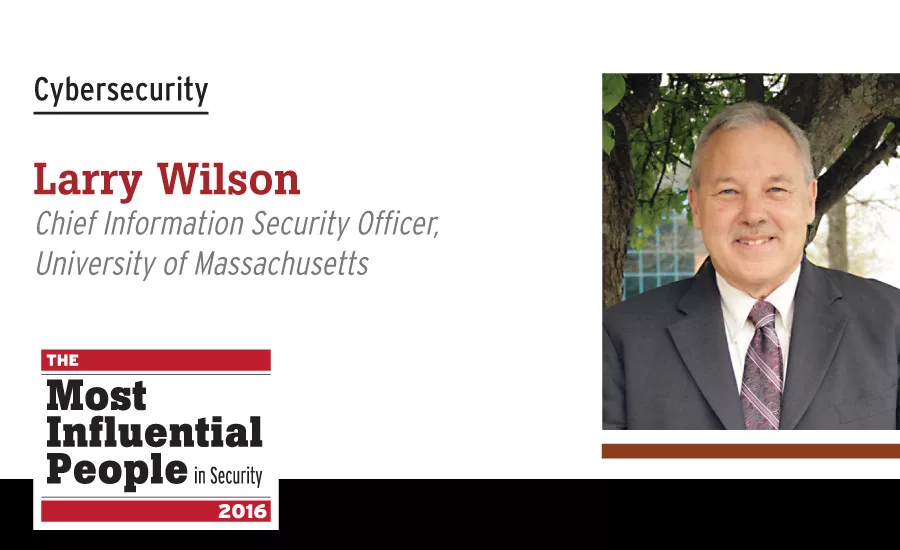
Larry Wilson, Chief Information Security Officer, University of Massachusetts
Larry Wilson is Chief Information Security Officerfor the University of Massachusetts. Wilson has created a program to operationalize the NIST Cyber Security Framework within governments and private enterprises. His easy-to-understand Controls Factory approach to adopting and adapting the framework and his willingness to collaborate on its future development is unmatched in the industry. Wilson and the University have also developed a model to create a cybersecurity workforce. The University’s Cybersecurity Task Force assesses the University’s academic capabilities in the area of cybersecurity, to understand how the University is positioned within the Commonwealth and region, as well as whatit would take to move forward, and to make recommendations on next steps in this direction. The Task Force published specific recommendations intended to launch a leadership role for the University to help address the cybersecurity needs of the Commonwealth and contribute significantly to the work of research universities nationwide. Consistent with the Cybersecurity Task Force recommendations, the University has made significant progress in establishing academic programs, student pathways and industry relationships. Some of the recent initiatives include the creation of the Massachusetts Cybersecurity Network and the development of new cybersecurity majors at the University of Massachusetts, the first site expansion of BHEF’s cyber strategy; the ACSC Cyber Exchange forum, which focused on building improved academic, government and university relationships and collaboration; new University adjunct faculty positions and new academic courses focusing on cybersecurity; and a 24/7 Cybersecurity Operations Center (CSOC) that offers managed Cybersecurity Services to local colleges and universities.
Overasll, with Wilson’s leadership, the UMASS program enables organizations to be more proactive in their approach without incurring the financial penalties of a service contract or needing to hire more bodies to manage it. By providing the program as a service, Wilson’s team takes the burden off of college and university officials while still enabling them to protect their critical institutional assets. The benefits of such a relationship include increased sharing of resources and workforce development, as the UMASS program provides ample on-the-job training to student interns. This year, the University will enhance cybersecurity education and workforce programs by supplementing student’s academic knowledge with opportunities for hands-on real-world experience via student internships. Wilson is the recipient of the ISE Project Award for North America (UMASS Cybersecurity Initiative), a 2013 SANS 2013 People Who Made a Difference in Cybersecurity Award and a finalist for the Information Security Executive (ISE) of the Year Award.
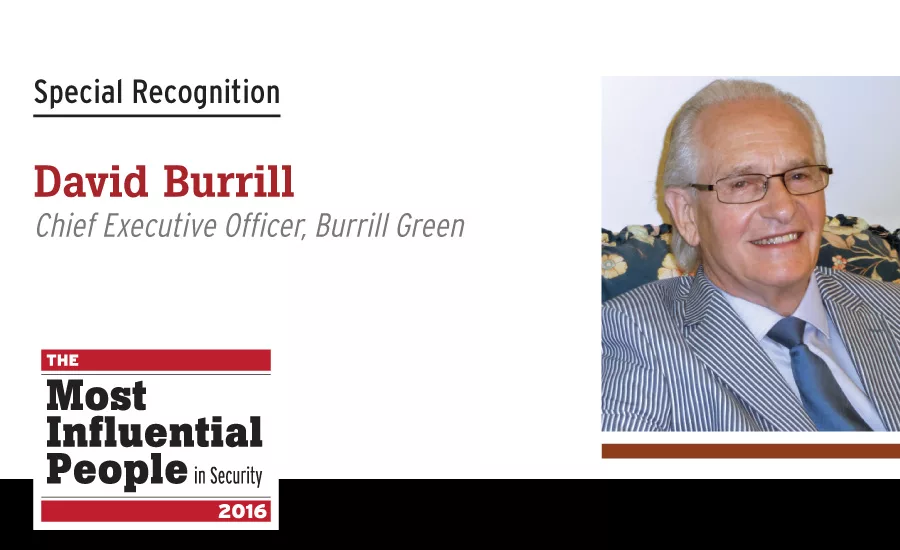
David Burrill, Chief Executive Officer, Burrill Green
David Burrill is Chief Executive Officer for Burrill Green, corporate security management consultants specializing in effective business security leadership recruitment and rapid response operation. For 32 years Burrill was a member of the British Army Intelligence Corps. In his military career, he held a number of key appointments, including head of intelligence and security for land forces in the Falklands Campaign, chief instructor for all Royal Navy, Army and some Royal Air Force security training, head of intelligence and security for the First British Corps, commander of the British armed forces interrogation and de-briefing organisation, chief of staff of the British defense intelligence and security centre and deputy director of the Intelligence Corps. He retired from the army to become Chief Security Officer at BAT Industries, a manufacturing and insurance industry conglomerate, later to become British American Tobacco – a company with presence in more than 180 countries. In January 2016, Burrill became the Chairman of the Trustee Board of the (British) Military Intelligence Museum.
Under Burrill’s 14-year stewardship, BAT became recognized (through independent research) as the international benchmark company for corporate security. His philosophy that “Corporate Security is to Companies what National Security is to Nations” proved a catalyst for the growing recognition that security can also be a business enabler and reputation enhancer. Burrill, who was educated at the Royal Military Academy Sandhurst, the Open University, and the Army Command and Staff College, has been a Defense Fellow at King’s College, London University. He is a Fellow of the Chartered Management Institute, the Chartered Institute of Personal Development and the Security Institute. He has been a leader in a number of Public Private Sector Partnerships (PPP) involving UK government departments, the U.S. State Department, the European Union, the World Customs Organization, INTERPOL and the World Intellectual Property Organization. He was the principal architect of the Security Information Service for Business Overseas (SISBO), a British equivalent of the U.S. State Department’s Overseas Security Advisory Council (OSAC), and was its first business co-chairman. Awarded the OBE by the Queen in 2003 for services to international security, he has also been honored with distinguished achievement awards from the U.S. Department of State, the International Security Management Association, of which he was the first non North American President, ASIS International and the Association of Security Consultants. Together with Kevin Green, his business partner, he has authored two books: Value from Security(2011) and Crossing the Line(2012).
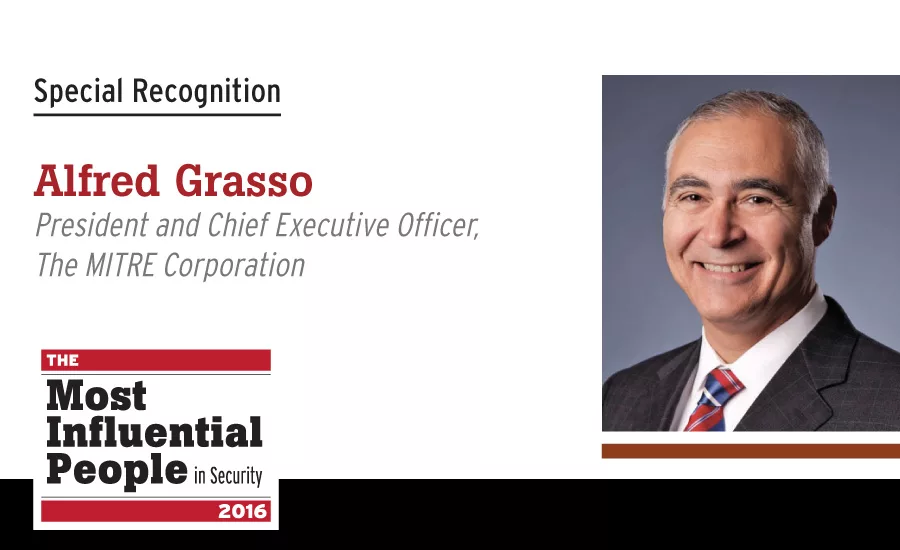
Alfred Grasso, President and Chief Executive Officer, The MITRE Corporation
Alfred Grasso is president and CEO of The MITRE Corporation. He is responsible for developing and leading the corporation's overall strategic and business operations for the federally funded research and development centers (FFRDCs) that MITRE manages. Grasso joined MITRE in 1986 and held positions of increasing responsibility in MITRE’s Command, Control and Communications Center until being named president and CEO in 2006. He was executive vice president and director of the Command, Control, Communications and Intelligence FFRDC, now known as the National Security Engineering Center (NSEC). Grasso also was senior vice president and general manager of MITRE’s Washington Command, Control, and Communications Center and vice president and CIO. Earlier he was technical director for the Battlefield Systems Division at the MITRE site in Fort Monmouth, New Jersey. Under Grasso’s leadership, MITRE has received several prestigious awards for its commitment to public service and technical excellence, including the Secretary of Defense Medal for Outstanding Public Service (2008), the Air Force Association’s Theodore von Karman Award (2008), and the National Aeronautic Association’s Collier Trophy (2007). Grasso served as chairman of the Armed Forces Communications and Electronics Association (AFCEA) International’s Board of Directors from 2012 to 2014 and was vice chair from 2010 to 2012. He remains a member of its Executive Committee and is a Permanent Director. In 2016, the association presented Grasso with its prestigious David Sarnoff Award, recognizing his support for AFCEA's Education Foundation. Federal Computer Week presented Grasso with its Eagle Award in 2012.
Grasso is an appointed member of the Defense Science Board. He is a member of the Stevens Institute Systems Engineering Research Center Advisory Board and a board member of the Northern Virginia Technology Council, the country’s largest technology council. Grasso also sits on the George Mason University Foundation Board of Trustees, University of Virginia’s Department of Systems and Information Engineering Advisory Board, and Howard University’s College of Engineering, Architecture, and Computer Sciences Board of Visitors. A first-generation Italian-American, Grasso has worked to advance educational opportunities for young people, particularly in the science, technology, engineering and mathematics fields. He is former president of the Board of the National GEM Consortium, a nonprofit that promotes the participation of under-represented groups in the STEM fields. In 2013, STEMconnector® named him to its 100 CEO Leaders in STEM list. In 2012, the Lido Civic Club of Washington, D.C., an Italian-American civic organization, named Grasso its Man of the Year for his long-standing commitment to advancing educational opportunities for young people.
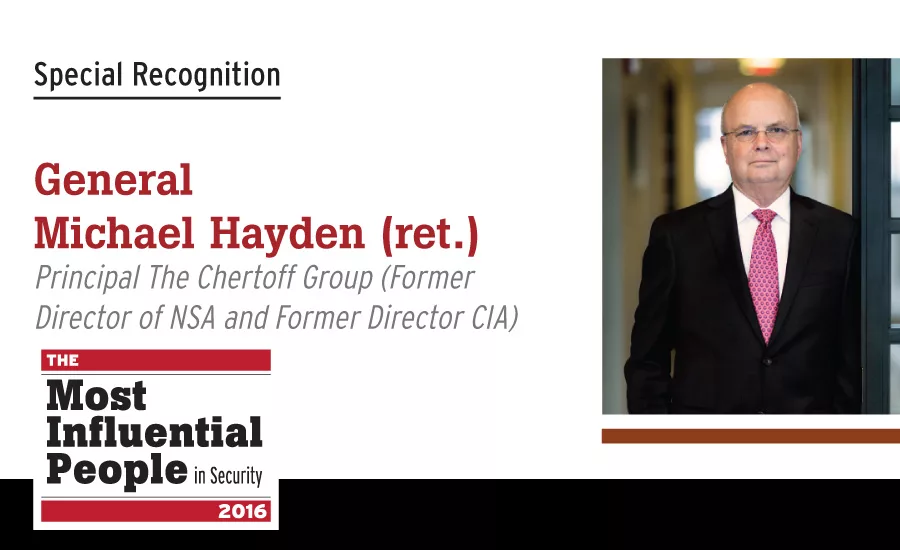
General Michael Hayden, (ret.) Principal The Chertoff Group (Former Director of NSA and Former Director CIA)
General Michael Hayden is a retired four-star general who served as director of the Central Intelligence Agency and the National Security Agency when the course of world events was changing at a rapid rate. As head of the country’s premier intelligence agencies, he was on the frontline of global change, the war on terrorism and the growing cyber challenge. He understands the dangers, risks and potential rewards of the political, economic, and security situations facing the U.S. In addition to leading CIA and NSA, General Hayden was the country’s first principal deputy director of national intelligence and the highest-ranking military intelligence officer in the country. Hayden also served as commander of the Air Intelligence Agency and Director of the Joint Command and Control Warfare Center and served in senior staff positions at the Pentagon, at U.S. European Command, at the National Security Council, and the U.S. Embassy in Bulgaria. He was also the deputy chief of staff for the United Nations Command and U.S. Forces in South Korea.
Hayden has been a frequent expert and commentator on major news outlets and in top publications, valued for his expertise on intelligence matters like cybersecurity, government surveillance, geopolitics, and more. He was featured in the HBO documentary “Manhunt,”which looked at espionage through the eyes of the insiders who led the secret war against Osama bin Laden, and in Showtime’s “The Spymasters,”a detailed look at the directors of the Central Intelligence Agency. Hayden is currently a principal at the Chertoff Group and a distinguished visiting professor at the George Mason University School of Policy, Government and International Affairs. He is on the board of directors of Motorola Solutions in and serves on a variety of other boards and consultancies. In 2013, the Intelligence and National Security Alliance (INSA) awarded Hayden the 29th annual William Oliver Baker Award. General Hayden is also the first recipient of the Helms Award presented by the CIA Officers’ Memorial Foundation. In 2014 he was the inaugural Humanitas visiting professor in intelligence studies at Oxford University in the United Kingdom. His recent memoir, Playing to the Edge: American Intelligence in the Age of Terror, has been a New York Timesbest-seller.
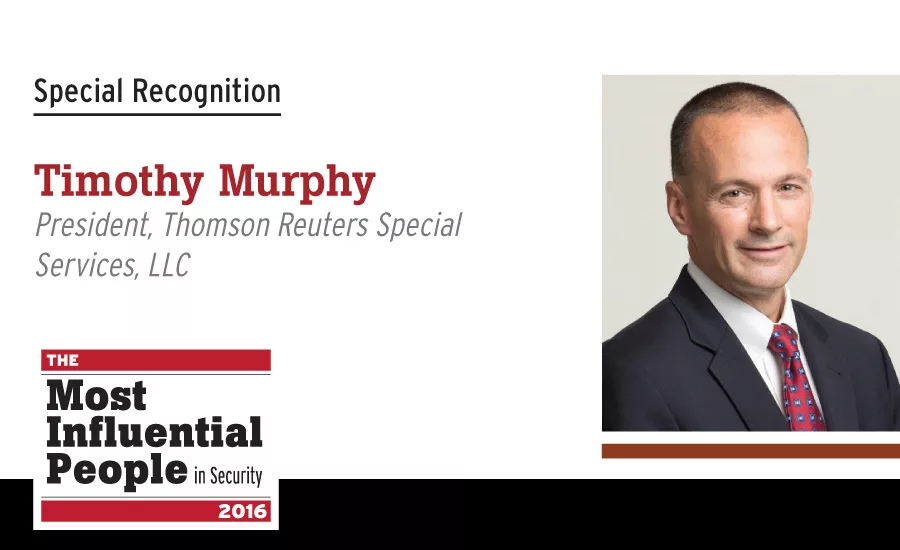
Timothy Murphy, President, Thomson Reuters Special Services, LLC
With more than 30 years of public and private sector experience – primarily in the Federal Bureau of Investigation – Timothy P. Murphy is a recognized leader in the global law enforcement, intelligence, security, and business communities. A Michigan native, Murphy became a police officer after graduating from college in 1983. In 1988, he joined the FBI as a special agent. He held a number of operational positions in a variety of field offices nationwide, investigating matters as diverse as counterterrorism, organized crime and drugs, and even serving as an FBI pilot. He then turned to management, serving as a supervisor in the field, focusing on administrative and business programs at FBI headquarters, and then serving as a special assistant to the FBI Director – a position that gave him a unique, high-altitude view of the global FBI from both operational and administrative perspectives.
Murphy steadily climbed the Bureau’s management ladder, eventually serving as the Special Agent in Charge of the Cincinnati field office, the Bureau’s CFO, and then its Chief Operating Officer. He eventually rose to become the Deputy Director of the FBI, a position he held until retiring in 2011. In these latter roles in the FBI, he focused on strengthening the Bureau’s infrastructure, finances and business processes – shifting from pursuing criminals to pursuing strategic ways to support the critical law enforcement and national security work of all FBI employees. As CFO and head of the Bureau’s finance division, Murphy oversaw the formulation and execution of a $10 billion budget. His main challenges were twofold – first, to link the Bureau’s resources to its long-term strategy; second, to run the FBI more like a business. He focused on revamping systems and restructuring business processes to streamline the Bureau’s operations. Instead of each component of the organization operating in its own silo, Murphy reoriented the Bureau around budget formulation, tying resources to emerging risks. As the FBI’s Associate Deputy Director and Chief Operating Officer, Murphy united the entire organization around a new set of strategic goals to allow the FBI to leap into the 21st century. After 23 years of service, Murphy retired from the FBI and joined MacAndrews and Forbes Holdings, Inc., a private, diversified holding company, where he served as a Vice President. He is a guest lecturer at colleges and universities. He is member of the Police Executive Research Forum, the International Association of Chiefs of Police, OSAC, the FBI/DHS Domestic Security Alliance Council, the FBI Agents Association and the FBI National Academy Associates. He also serves on the advisory board of three cybersecurity companies.
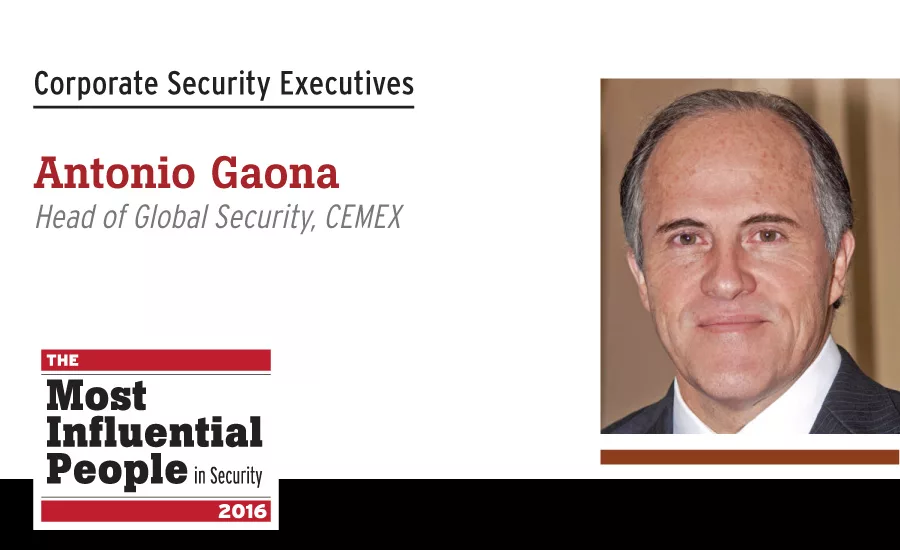
Antonio Gaona, Head of Global Security, CEMEX
Antonio Gaona, Head of Global Security for CEMEX, has more than 23 years of global experience within the private sector as a Senior Security Executive responsible for directing security departments of Retail, Construction, Tobacco and Telecommunications Companies. In his current role, he is responsible for creating global intelligence systems, global security relations, due diligence and post-merger integration operations, developing and implementing a global security company strategy, and all international security business regulations with customs border protection. He is also responsible for crisis management and business continuity programs, as the company operates in high-risk countries in South East Asia, Middle East and LATAM. Gaona has 20 years of governmental and Army experience, retiring as a Lieutenant Colonel, as he was responsible for Presidential Executive Protection, diplomatic protection, judge advocate general commissions and international executive protection. He is a Certified Director of Security (DSE) from the Pontifice University of Madrid Comillas post-graduate course.
He’s active within the international security community; he has been a member of the Board of the International Security Management Association (ISMA), assisting in the development of professional development courses with the Kellogg School of Business, in addition to teaching the Strategic Security course for the University of Madrid and the University of Nuevo Leon. He has also been a CSO ASIS member for the past 12 years. Gaona frequently speaks for ASIS Europe in Berlin, the University of Madrid in Spain, OSAC and other associations in Latin America.
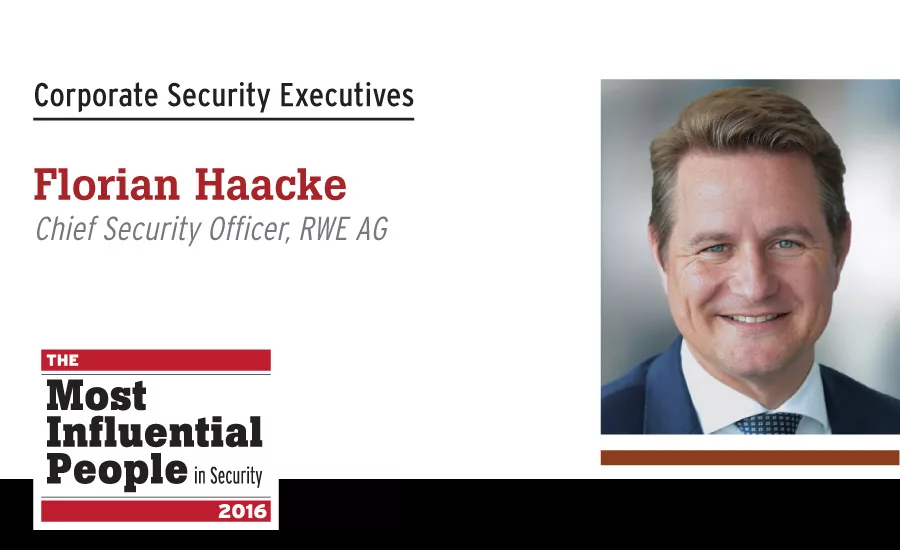
Florian Haacke, Chief Security Officer, RWE AG
Florian Haacke is the Chief Security Officer of RWE AG, a role he has held since 2013. RWE is one of Europe’s leading electricity and gas companies, which serves more than 16 million electricity and seven million gas customers. In fiscal year 2015, the company recorded $48.6 billion in revenue. In his current role, Haacke has successfully managed the forward-looking convergence of physical and cyber security within the RWE Group. His most notable achievements include the bundling, centralization and professionalization of the group-wide security organization, which includes cybersecurity and IT security governance, security technology, BCM and crisis management, forensics and executive and event protection. Haacke has strengthened the company’s cybersecurity department to now include four teams of experts who work to achieve synergies through collaboration between physical security and cybersecurity.
As major of the German Armed Special Forces, Haacke leads and trains a special task force team, which regularly practices special skills, tactics and strategies. He is also a chairman of the executive board of the Alliance for Security in the Economy in Northrhine-Westfalia (ASW NRW). In this function, he has initiated and actively steered a complex merger of the major security associations in Germany under the umbrella of the Alliance for Security in Germany (ASW Bundesverband), to ensure a strong unity with one identity, one voice and one DNA. Haacke has also strongly supported the development of the German Security Management Academy, which provides education for senior security experts. In 2015, Haacke was actively engaged in the development of a competence atlas which was developed by security professionals in collaboration with an international consultant company. The competence atlas contains a holistic, future proof competence profile for Corporate Security professionals which is used by many German corporations for hiring. Haacke is involved in the development of the IT Security legislation in Germany and in the EU. Haacke lectures in four German universities, and is a member of the program advisory board of the German Security Management Academy. Furthermore, he is a member of the advisory board of the world's leading fair for security and fire prevention in Essen, in which he also is a member of the jury for the fair’s Security Innovation Award. Haacke has received honorary appointments as chairman of the Alliance for Security in the Economy in Northrhine-Westfalia (ASW NRW), and as a member of the Subcommittee of the Federal of German Industries (BDI).
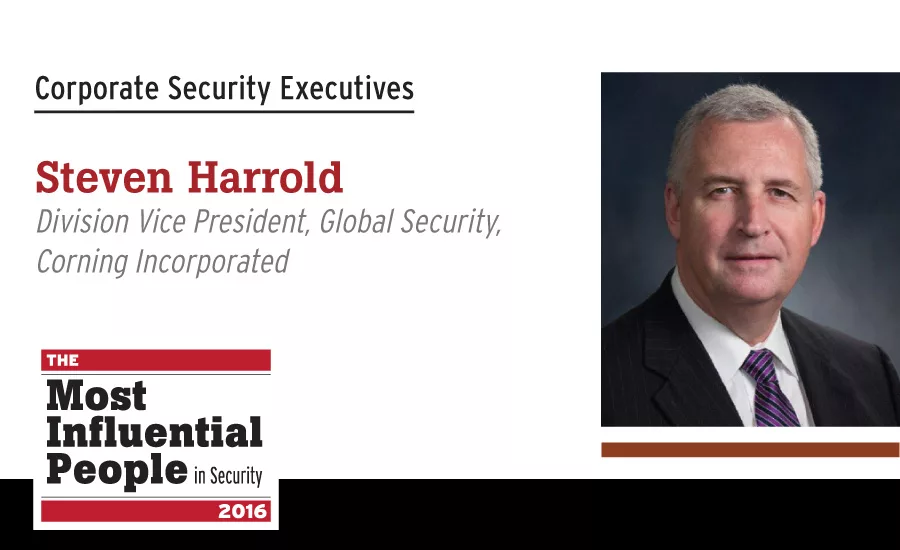
Steven Harrold Division, Vice President, Global Security, Corning Incorporated
Steven J. Harrold joined Corning in January 2013, as Director, Corporate Security. Corning is one of the world’s leading innovators in materials science. For more than 160 years, Corning has applied its expertise in specialty glass, ceramics and optical physics to develop products that have created new industries. Corning’s products include damage-resistant cover glass for smartphones and tablets; precision glass for advanced displays; optical fiber, wireless technologies and connectivity solutions for high-speed communications networks; trusted products that accelerate drug discovery and manufacturing; and emissions-control products for cars, trucks and off-road vehicles. In his role as Corning’s Vice President of Global Security, Harrold is responsible for leading Corning’s global security and business continuity functions.
Prior to joining Corning, Harrold worked at Fidelity Investments where he held the position of senior vice president and chief ethics officer. While at Fidelity, Harrold also served as Vice President, Corporate Security, and was responsible for international security programs and due diligence investigations. Prior to Fidelity Investments, Harrold worked at 3M Company and held the roles of corporate security director and global business director for 3M’s commercial security products division. Harrold holds a bachelor’s degree from Bryant University, a Juris Doctor degree with honors from Western State University College of Law and is a member of the State Bar of California. He is also a member of ASIS International and holds the Certified Protection Professional board designation in security management. Harrold is a member of the International Security Management Association (ISMA), serving as the Chairman of its External Relations Committee and member of the Governance Committee, the Conference Board of Corporate Security Executives, and serves on the advisory board for the Criminal Justice Degree Program at Corning Community College. Harrold is also a PECB Certified ISO 22301 Lead Implementer. Most recently at Corning, Harrold created a new GSOC that is all about communications, collaboration and staying connected. It is people-focused with an optimal design that is a different take than traditional GSOC layouts. The new GSOC offers unprecedented enterprise situational awareness to identify threats and related vulnerabilities, in addition to enabling effective communication and mitigation against risk before a security-related event occurs.
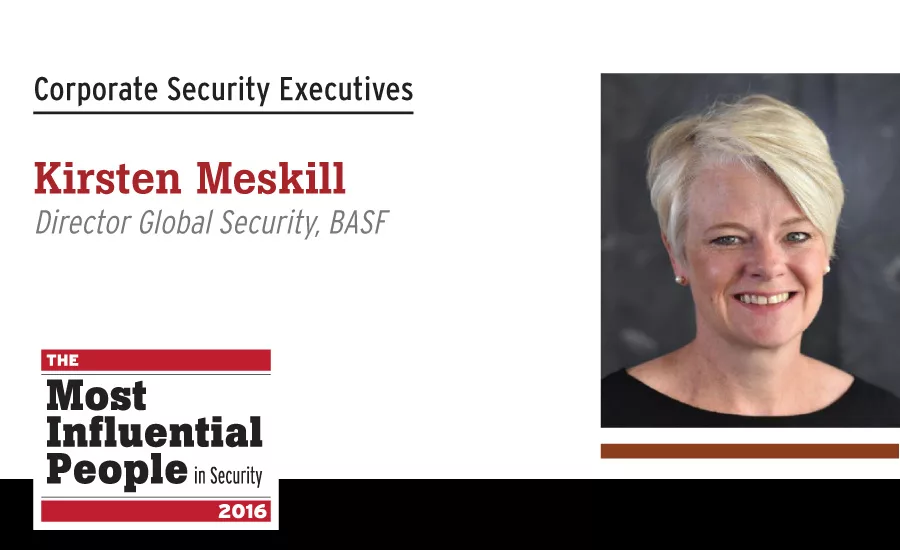
Kirsten Meskill, Director Global Security, BASF
Kirsten M. Meskill is the Director, Corporate Security at BASF Corporation, headquartered in Florham Park, New Jersey, and the North American affiliate of BASF SE, Ludwigshafen, Germany. BASF hasnearly 17,500 employees in North America and had sales of $17.4 billion in 2015. The company’s portfolio is organized into five segments: Chemicals, Performance Products, Functional Materials & Solutions, Agricultural Solutions and Oil & Gas. In her role at BASF, Meskill serves as the internal and external focal point for expertise in matters related to physical security standards and relevant regulatory requirements, personnel and travel security, information protection, distribution network security, criminal syndicate activity and related investigations.
Prior to BASF, Meskill was the Chief Security Officer at Kraft Foods and later Mondelez International. In these roles, she developed and implemented strategic initiatives designed to protect company employees, products, brands and operations across the globe with a specific focus on consumers. She built and implemented Food Defense (food tampering prevention) programs to protect consumers, brands and reputation while adhering to U.S. Bioterrorism Act guidelines for the company and its partners.
She began her private sector career with Philip Morris in the transportation and logistics field and later moved into the Company’s corporate security function. Following its spin-off from Phillip Morris, Meskill transferred to Kraft Foods and held positions in crisis management and security and was Kraft Foods’ European Compliance Officer based in Zurich, Switzerland. She graduated from Fordham University and was commissioned in the U.S. Army, serving 14 years combined active and reserve duty, primarily in Europe. She is on the education committee for ISMA, an ISMA Georgetown Academic Advisor, on the security committee for the American Chemistry Council (ACC) and on the security committee for the Society of Chemical Manufacturers and Affiliates.

Chris Rackow, Senior Vice President/ Chief Resilience Officer, AECOM
Chris J. Rackow serves as Senior Vice President, Chief Resilience Officer for AECOM, an $18-billion, fully integrated infrastructure and support services firm with the ability to design, build, finance and operate infrastructure assets globally. Rackow is responsible for developing and directing enterprise resilience defined as the ability to pursue, protect and sustain business operations anywhere in the world AECOM chooses to operate. Rackow leads AECOM’s efforts to identify and integrate core competencies and innovative concepts that help AECOM and its customers become more resilient in an increasingly hyper-connected world.
He is a recognized expert in geo-political affairs, corporate security strategy (physical and cyber), global risk management and national security. His expertise stems from unique positions held in the public and private sectors throughout his career.
As a U.S. Navy SEAL officer, he supervised the operational employment of SEAL elements across Southwest, Southeast and Northeast Asia. Upon separating from active military duty, Rackow held various positions within the Federal Bureau of Investigation as a Special Agent and Supervisory Special Agent. Tours of duty included the Criminal Investigative Division, Counterterrorism Division and the Critical Incident Response Group, where he was assigned to the elite Hostage Rescue Team. Concurrently, he maintained his service as a U.S. Naval Reserve SEAL Officer until retiring at the rank of Commander.
Following his government career, Rackow worked for Raytheon as a business development manager charged with designing strategic frameworks for penetrating and achieving sustainable growth in specialized segments of the global defense industry. Prior to joining AECOM, Rackow was Vice President, Corporate Security for ABB, a global power/productivity corporation that is headquartered in Switzerland.
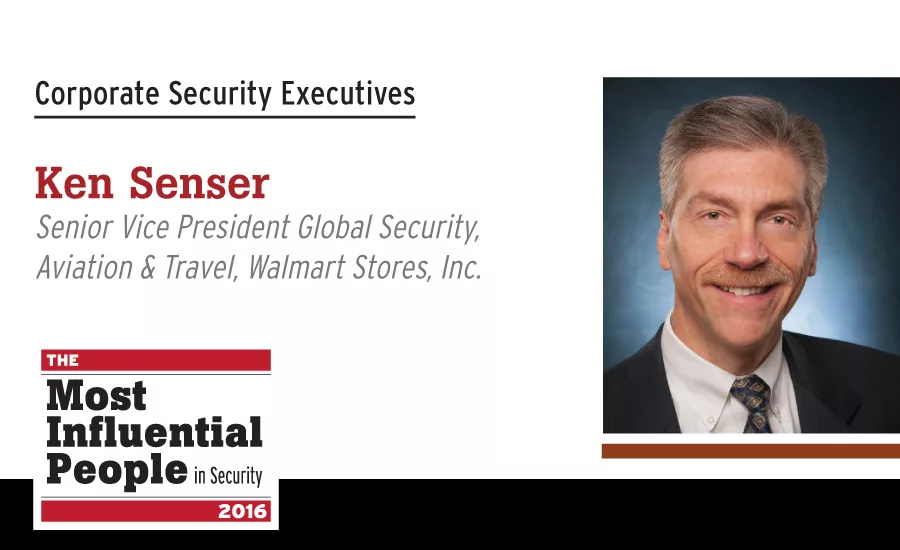
Ken Senser, Senior Vice President Global Security, Aviation & Travel, Walmart Stores, Inc.
Kenneth H. Senser is Senior Vice President, Global Investigations, Security, Aviation and Travel (GISAT) for Walmart Stores. Senser joined the company in September 2003 as the Vice President for Global Security. In August 2004, his responsibilities expanded to include Aviation and Travel leading to his promotion in December 2005 to Senior Vice President. In his capacity as Senior Vice President for GISAT, Senser is responsible for implementing a comprehensive global strategy to protect all associates, information, facilities, equipment and other assets of Walmart, as well as to provide a competitive business advantage through safe, reliable and efficient transportation for company associates. Walmart is the largest business and retailer in the world by revenue ($482 billion) that serves close to 260 million customers each week globally in more than 11,500 stores operating under 63 banners in 28 countries (and sourcing product in more than 60 countries) with 2.3 million employees – 1.5 million in the U.S. alone.
Senser leads programs such as Business Continuity, Global Readiness and Crisis Response, Global Investigations, Security Technology, Corporate Security, Executive Protection, International Asset Protection, Aviation and Maintenance, and Global Travel. Prior to joining Walmart, Senser was a Central Intelligence Agency, Office of Security careerist detailed to the FBI as the Assistant Director for Security.
After the espionage arrest of Robert P. Hanssen in early 2001, Senser initiated the transformation of the FBI security program into a capable and fully integrated organization. Senser established and ran the day-to-day operations of the first division in the FBI’s history to focus on security. He led all aspects of the security program, to include the personnel, industrial, facility and information systems security activities. Senser joined the Central Intelligence Agency in 1983 and was promoted into the Senior Intelligence Service in 1996. During his tenure, Senser held a variety of senior management positions and served in assignments encompassing the physical, technical, protective and personnel security disciplines. While with the CIA, Senser received one of its most prestigious awards, the Distinguished Career Intelligence Medal, as well as the Career Intelligence Medal, Intelligence Commendation Medal. Before joining the government, Senser spent two years conducting criminal fraud investigations in Ohio. He received a BS in Criminal Justice from the University of Cincinnati. He is a member of the American Society for Industrial Security, International Association of Chiefs of Police, ISMA and the Domestic Security Alliance Council.

Jeff Young, Executive Director, Integrated Protection Services, Fraser Health
Jeff Young is Executive Director of Integrated Protection Services (IPS) for one of the largest healthcare protection programs in North America: Fraser Health, Provincial Health Services Authority, Providence Health & Vancouver Coastal Health. IPS consists of two main streams: protection/security and heliport operations and parking, access, commuter and fleet services. IPS supports a safe, secure and accessible environment of care that then allows our clinical staff to provide the best patient care possible. Combined, the four health organizations represent an operating budget of $7 billion and comprise more than 65,000 staff, servicing a population of three million people through the systems’ 28 acute care hospitals, 44 residential care facilities and more than 500 other community care sites, which serves the health needs of the lower mainland and specialized health needs for the Province.
His leadership has led to a workforce of health authority-employed management and unionized staff, along with a large contingent of front line outsourced staff that combined represents 550 staff with an overall operating budget of $35 million. Young met provincial government consolidation sustainable cost savings targets and contained costs within the operating budget while also surpassing revenue targets. He has consolidated three legacy outsourced service contracts into a single scope and contract, netting $2.85 million in savings, and has led the vision and implementation of an enterprise incident-reporting system to capture 160,000 incident reports annually to allow for data-driven and evidence-based decision making to support resource allocation. His Health Heliport Operations have been recognized as a Leading Practice by Accreditation Canada.
His threat management program, a component of a comprehensive violence prevention program, has been identified as a leading practice submission by Accreditation Canada and modeled Province-wide.
As a mentor, he has implemented an “IPS Leaders of Tomorrow” mentorship program that seeks to support personal and professional growth, and has supported (financially and through investing time) staff to attend personal and professional growth courses.
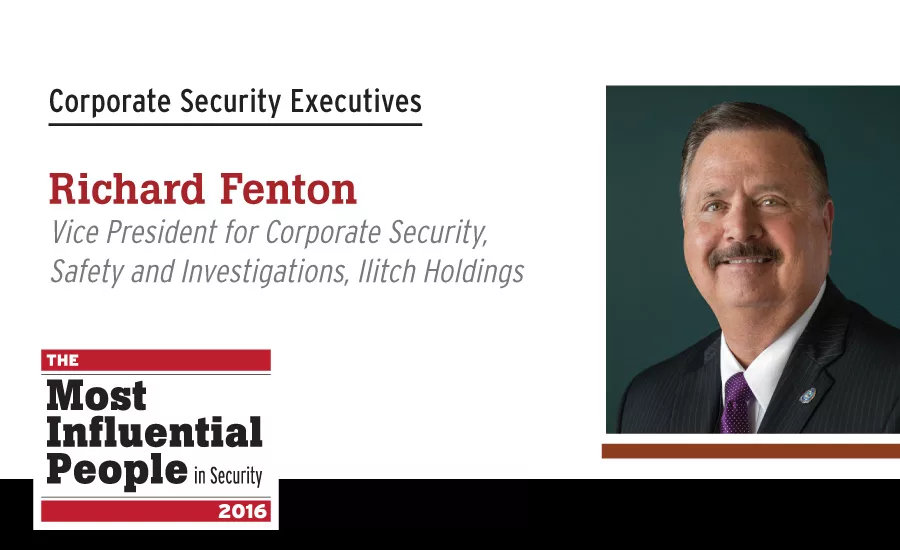
Richard Fenton, Vice President for Corporate Security, Safety and Investigations, Ilitch Holdings
Richard Fenton, Vice President for Corporate Security, Safety and Investigations, Ilitch Holdings, which include the Detroit Tigers and Detroit Red Wings, has been at the forefront of integrating new security technologies and operating procedures in the security realm and has been instrumental in partnering with public and private law enforcement and security agencies to significantly enhance the safety and security for the Ilitch Companies; while at the same time, securing more than $200,000 in Federal Grants for security enhancements and equipment for the Ilitch Holdings operational venues. Fenton oversees/directs all corporate security and safety functions, venue security and safety, security systems, corporate loss prevention, investigations and executive services across all of the Ilitch Companies.
During his tenure, Fenton chaired the Public Safety/Private Security Planning Committee for the Major League Baseball All Star Game held in Detroit in 2005, served on the same planning committee for the NFL Superbowl/SBXL, and chaired the Transportation Planning Committee for the NCAA Final Four. He is a retired Executive Commander of the Wayne County Sheriff Department with more than 27 years of service. He also served as Police Chief/Commander at Detroit Metro and Willow Run Airports for seven years. Fenton is the leading agent in the development of the safety and security facility designing, security operational planning etc. for the $650 million plan for a new arena development for the NHL the Red Wings in Detroit’s downtown entertainment and sports district. He is also the Co-Founder of the innovative and successful Public Safety/Private Security Partnership, “Lighthouse Program,” a multifaceted Law Enforcement/Private Security program developed for the City of Detroit’s Central Business District with the goal of enhancing the safety and security for guests, patrons, employees and residents through cooperative and coordinated private/public partnerships of security and law enforcement entities serving the area. He has been part of the adjunct faculty at Eastern Michigan University for 18 years, teaching in the Interdisciplinary Technology Department and School of Police Staff & Command. Additionally, he has been a guest instructor at the Northwestern University Traffic Institute/School of Police Staff and Command as well as the FBI National Academy. He was very active with the development of the Certified Sports Security Professional (CSSP). In 2011, The National Hockey League and the University of Southern Mississippi NCS4 Program selected Richard Fenton/Ilitch Holdings/Joe Louis Arena for its Distinguished Facility Achievement Award, noting that Joe Louis Arena and the Detroit Red Wings were the model security group for NHL arenas.
Sign-up to receive top management & result-driven techniques in the industry.
Join over 20,000+ industry leaders who receive our premium content.
SIGN UP TODAY!Copyright ©2026. All Rights Reserved BNP Media.
Design, CMS, Hosting & Web Development :: ePublishing